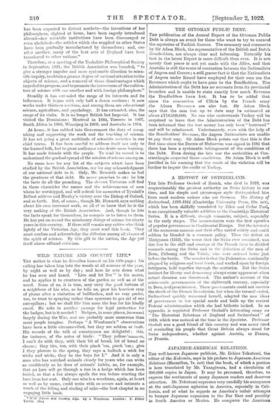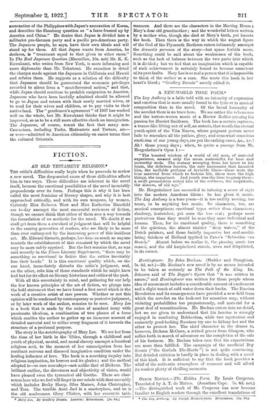JAPANESE-AMERICAN RELATIONS.
THE well-known Japanese publicist, Mr. Iichiro Tokutomi, the editor of the Hokumin, says in his preface to Japanese-American Relations (Macmillan, '7s. net) that the book, of which a portion is here translated by Mr. Yanagiwara, had a circulation of 300,000 copies in Japan. It may be presumed, therefore, to express the sentiments of many Japanese readers and deserves attention. Mr. Tokutomi expresses very candidly his annoyance at the anti-Japanese agitation in America, especially in Cali- fornia, and at what he regards as America's unfair attempts to hamper Japanese expansion in the Far East and possibly in South America or Mexico. He compares the American annexation of the Philippines with Japan's annexation of Korea, and describes the Shantung question as " a farce framed up by America and China." He denies that Japan is divided into a militarist pro-German party and a pacffio pro-American party. The Japanese people, he says, have their own ideals and will stand up for them. All that Japan wants from America, he declares, is " treatment equal to that given to other races." In The Real Japanese Question (Macmillan, 10s. net) Mr. K. K. Kawakami, who writes from New York, is more informing and more diplomatic than Mr. Tokutomi. He examines in detail the charges made against the Japanese in California and Hawaii and refutes them. He suggests as a solution of the difficulty that Japanese should be guaranteed the economic privileges accorded to aliens from a " most-favoured nation," and that, while Japan should continue to prohibit emigration to America, Japanese who have been lawfully admitted should be allowed to go to Japan and return with their newly married wives, or to send for their wives and children, or to pay visits to their native land. The " gentlemen's agreement " of 1007 has worked well on the whole, but Mr. Kawakami thinks that it might be improved, so as to be a still more effective check on immigration. The Japanese, of course, resent the fact that many non- Caucasians, including Turks, Hottentots and Tartars, are— or were—admitted to American citizenship on easier terms than the cultured Orientals.



































 Previous page
Previous page